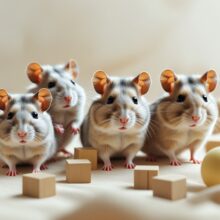Gerbil Care Essentials

Gerbil Care Essentials
Gerbils are charming little creatures that make wonderful pets due to their playful nature, social behavior, and relatively low-maintenance care requirements. However, to ensure that your gerbil remains healthy and happy, it’s important to understand the essentials of gerbil care. This guide will cover everything you need to know about taking care of your gerbil, from setting up their habitat to providing the right diet and ensuring their well-being.
Setting Up the Ideal Gerbil Habitat
Creating a suitable living environment is crucial for your gerbil’s health and happiness. Here’s what you need to consider:
Cage Selection
Choose a spacious and secure cage for your gerbils. A glass aquarium or a wire cage with a solid base is ideal. The cage should be at least 20 gallons in size for a pair of gerbils. A larger cage is always better, as it allows more room for activities and enrichment.
- Aquariums: Glass aquariums provide excellent visibility and are escape-proof. Ensure it has a secure mesh lid for ventilation.
- Wire Cages: These offer good airflow but should have a solid base to prevent injuries from wire floors. Make sure the bars are close enough together to prevent escapes.
Bedding and Substrate
Gerbils love to dig and burrow, so providing the right bedding is essential. Use materials such as aspen shavings, paper-based bedding, or hay. Avoid pine and cedar shavings, as they can be harmful to gerbils.
- Depth: Provide a deep layer of bedding (at least 6 inches) to allow for burrowing.
- Safety: Choose bedding that is dust-free and non-toxic to ensure your gerbils’ respiratory health.
Enrichment and Accessories
To keep your gerbils mentally stimulated and physically active, include plenty of enrichment items in their cage:
- Tunnels and Hideouts: Provide tunnels, tubes, and hideouts to mimic their natural burrowing environment.
- Chew Toys: Gerbils have continuously growing teeth, so offering a variety of chew toys is essential to keep their teeth healthy.
- Exercise Wheel: A solid surface exercise wheel allows them to run and exercise. Avoid wire wheels to prevent injuries.
- Climbing Structures: Add branches, ladders, and platforms to encourage climbing and exploration.
Diet and Nutrition
A balanced diet is crucial for your gerbil’s overall health and well-being. Here’s what you need to know about feeding your gerbil:
Commercial Gerbil Food
High-quality commercial gerbil food or pellets should form the basis of their diet. These foods are specially formulated to meet their nutritional needs and provide a balanced mix of protein, fats, and carbohydrates.
Fresh Fruits and Vegetables
Supplement your gerbil’s diet with fresh fruits and vegetables. These provide essential vitamins and minerals and add variety to their diet. Safe options include:
- Fruits: Apples (without seeds), bananas, berries, and melons.
- Vegetables: Carrots, broccoli, kale, and spinach.
Avoid citrus fruits and any toxic foods such as chocolate, onions, and garlic.
Protein Sources
Gerbils are omnivores and benefit from occasional protein sources. You can offer small amounts of:
- Boiled Eggs: Rich in protein and easy to digest.
- Mealworms: Provide essential fats and proteins.
- Cooked Chicken: Ensure it is plain and unseasoned.
Water
Provide fresh, clean water at all times. Use a sipper bottle attached to the cage to ensure the water stays clean and accessible. Check the bottle daily to ensure it is functioning properly and refill as needed.
Health and Wellness
Maintaining your gerbil’s health involves regular monitoring, proper hygiene, and prompt attention to any signs of illness.
Regular Health Checks
Conduct regular health checks to monitor your gerbil’s well-being. Look for signs of illness such as:
- Lethargy: Reduced activity levels can indicate a health issue.
- Weight Loss: Sudden weight loss or loss of appetite is a red flag.
- Discharge: Any discharge from the eyes, nose, or mouth should be addressed.
- Fur Condition: Dull or matted fur can be a sign of poor health.
Veterinary Care
Schedule regular veterinary check-ups with a vet experienced in small animals. They can provide preventive care and address any health concerns promptly. Be sure to discuss vaccination and parasite prevention with your vet.
Cleaning and Hygiene
Maintaining a clean environment is crucial for your gerbil’s health:
- Spot Cleaning: Remove soiled bedding and waste daily to keep the cage clean.
- Deep Cleaning: Perform a thorough cleaning of the cage and accessories every few weeks. Use pet-safe disinfectants and rinse thoroughly before replacing the bedding.
Social Interaction and Handling
Gerbils are social animals and thrive on interaction with their owners and other gerbils:
Companionship
Keep gerbils in pairs or small groups to prevent loneliness and promote natural social behaviors. Same-gender pairs are ideal to avoid breeding.
Handling
Gently handling your gerbils helps build trust and prevents skittish behavior:
- Start Slowly: Allow your gerbils to get used to your presence before attempting to handle them.
- Use Both Hands: Scoop your gerbil with both hands to provide support and prevent falls.
- Be Gentle: Avoid grabbing or squeezing your gerbil, as this can cause stress and injury.
Enrichment and Play
Providing mental and physical stimulation is key to preventing boredom and promoting overall well-being:
Toys and Activities
Offer a variety of toys and activities to keep your gerbils entertained:
- Chew Toys: Wooden chews, cardboard tubes, and untreated wood branches.
- Puzzle Toys: Provide food-dispensing toys to encourage foraging behavior.
- Playtime: Allow supervised playtime outside the cage in a safe, enclosed area.
Creating a Safe Play Area
Designate a gerbil-proofed area for supervised playtime. Remove any hazards such as electrical cords, toxic plants, and small objects that could be ingested.
Conclusion
Caring for gerbils involves understanding their unique needs and providing a safe, stimulating, and loving environment. By setting up an ideal habitat, offering a balanced diet, maintaining their health, and providing social interaction and enrichment, you can ensure that your gerbils lead happy and healthy lives. Gerbils are delightful companions that bring joy and entertainment to any home, and with the right care, they can thrive and become cherished members of your family.



